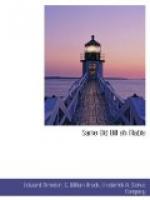Before the need-journey no one becomes more wise in thought than he ought to be, (in order) to contemplate, ere his going hence, what for his spirit, (either) of good or of evil, after (his) death-day, will be adjudged.
It is from Beda’s Church History, Book IV, chap. 24 (or 22), that we learn the story of C{ae}dmon, the famous Northumbrian poet, who was a herdsman and lay brother in the abbey of Whitby, in the days of the abbess Hild, who died in 680, near the close of the seventh century. He received the gift of divine song in a vision of the night; and after the recognition by the abbess and others of his heavenly call, became a member of the religious fraternity, and devoted the rest of his life to the composition of sacred poetry.
He sang (says Beda) the Creation of the world, the origin of the human race, and all the history of Genesis; the departure of Israel out of Egypt and their entrance into the land of promise, with many other histories from holy writ; the incarnation, passion, and resurrection of our Lord, and His ascension into heaven; the coming of the Holy Spirit and the teaching of the Apostles. Likewise of the terror of the future judgement, the horror of punishment in hell, and the bliss of the heavenly kingdom he made many poems; and moreover, many others concerning divine benefits and judgements; in all which he sought to wean men from the love of sin, and to stimulate them to the enjoyment and pursuit of good action.
It happens that we still possess some poems which answer more or less to this description; but they are all of later date and are only known from copies written in the Southern dialect of Wessex; and, as the original Northumbrian text has unfortunately perished, we have no means of knowing to what extent they represent C{ae}dmon’s work. It is possible that they preserve some of it in a more or less close form of translation, but we cannot verify this possibility. It has been ascertained, on the other hand, that a certain portion (but by no means all) of these poems is adapted, with but slight change, from an original poem written in the Old Saxon of the continent.
Nevertheless, it so happens that a short hymn of nine lines has been preserved nearly in the original form, as C{ae}dmon dictated it; and it corresponds closely with Beda’s Latin version. It is found at the end of the Cambridge MS. of Beda’s Historia Ecclesiastica in the following form:
Nu scylun hergan hefaenricaes uard, metud{ae}s maecti end his modgidanc, uerc uuldurfadur; sue he uundra gihuaes, eci Dryctin, or astelid{ae}. He aerist scop aelda barnum heben til hrofe, haleg scepen[d]. Tha middungeard moncynn{ae}s uard, eci Dryctin, {ae}fter tiad{ae} firum fold[u], frea allmectig.
I here subjoin a literal translation.




